Joint Programme: Accelerating Progress towards the Economic Empowerment of Rural Women
In support of rural women's economic empowerment UN Women, FAO, IFAD and WFP are spearheading a more comprehensive UN system response through joint actions in the format of a 5-year pilot programme. Read more »
Related Launch Events on the Joint Programme
Side event on the occasion of the 39th Session of the Committee on World Food Security
When: Monday, 15 October 2012, 13:30-14:30 PM Rome Time
Where: FAO, Viale delle Terme di Caracalla, Rome
More:
Archived Webcast of the Event
Side event on the occasion of the 67th UN General Assembly, New York
When: 27 September 2012, 1:00 PM to 2:45 PM New York Time
Where: The Millennium UN Plaza Hotel, The Riverview Room, 28th floor, New York
Working Together for Rural Women
Gender inequality and limited access to credit, healthcare and education have posed a number of challenges for rural women and the global food and economic crisis have only aggravated the situation. About 60 percent of the chronically hungry people in the world are women and girls. FAO, IFAD and the WFP collaborate in a number of ways with UN entities and external partners to empower rural women globally. Below are select highlights on joint efforts around the world.
Jarkyn, a Role Model for Many Rural Women
Where: Small mountainous village in Madaniyat, east of Bishkek, Kyrgyzstan
Who: FAO, UN Women, WFP
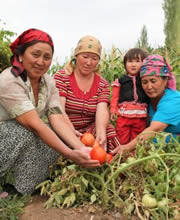
When you see energetic and self-confident Jarkyn Smanalieva rushing from one house to the other calling women for a community meeting in the small mountainous village of Madaniyat east of Bishkek, you would never guess that only three years ago she was an exhausted mother of four. Jarkyn was skeptical when she and 57 other women from her village were invited to join a vegetable growing project for women WFP, FAO and UN Women run. Skepticism turned into appreciation when women were able to sell their first harvest surplus, on top of being able to add fresh produce to their daily diet. With assistance from WFP, FAO and UN Women, Jarkyn and other women in her community established a Community Seed Farm called Ak-Monguluu (Mountains with Snow White Glaciers) that served as a credit facility for future seeds and other inputs for new participants next season. Jarkyn was unanimously selected the Chair of Ak-Monguluu for her dynamism and dedication. Read more »
Forests, a source of life for women in Burkina Faso
Where: Burkina Faso
Who: FAO, Tree Aid, Ministry of the Environment
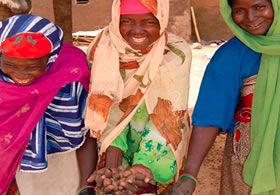
Almost all of Burkina Faso is covered by tree or wooded savannah, so it is hardly surprising that here, rural women boast a long tradition of relying on forest products for a variety of purposes: be it for food, medicines, clothing, tools or the manufacture of dyes. For Burkinabé women, it is those products classified as 'non wood forest products' that are most important. They include many wild foods, such as nuts and fruits, leaves, mushrooms, honey, edible insects (caterpillars and termites), as well as spices, herbs, fibers, oils and other animal or plant products used for food, medicinal or cosmetic preparations. Seeing the potential of these forest products in improving the lives and incomes of rural women, FAO set out in 2009, to establish a project across seven provinces in the North and Centre North of Burkina Faso. Read more »
Villagers Shift Away From Traditional Farming
Where: Moyal village, far-west Nepal
Who: Deutsche Gesellschaft für Internationale Zusammenarbeit (GIZ), WFP
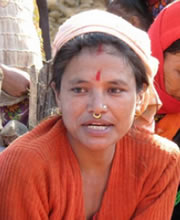
In a remote hilly village of Moyal in far-west Nepal, 40-year-old Pabitra Bista always had to struggle to produce enough food for her family. Like many other men, low yields, unreliable weather and lack of employment opportunities had forced her husband to seek alternative livelihoods away from home leaving her to tend to farming. Pabitra's fortune began to change in 2011, when WFP, in partnership with the Deutsche Gesellschaft für Internationale Zusammenarbeit (GIZ), introduced the community-based commercial farming of cash crops in her village to improve the livelihoods of local people through effective long-term agricultural interventions. Pabitra was one among a group of 25 food-insecure households from the village, who worked collectively on a leased land of 1.25 hectares for commercial farming of chilly in the first cycle (May–October 2011) with support from WFP and GIZ-Improvement of Livelihoods in Rural Areas. Read more | Photo slideshow
Strengthening Women's Access to Land
Where: Tanzania
Who: Belgian Fund for Food Security, IFAD, International Land Coalition

Despite equal-rights legislation on the books in Tanzania, customary norms continue to limit rural women's ownership and control of land. The Sustainable Rangeland Management Project — implemented by the International Land Coalition with support from IFAD and the Belgian Fund for Food Security (BFFS) — was set up in 2009 to help secure women's land rights through the Village Land Use Planning process. Support for gender equity is essential to the viability of this process, which requires community-level plans for the use of land and natural resources in rural areas. The Project intends to proactively consider women's land rights, to protect them when already existing and to foster them when they are neglected. The project intervention area consists of the districts of Bahi, Chamwino, and Kondoa in Dodoma region and Kiteto district in Manyara Region. Read more: Research report | Fact sheet (English) | Fact sheet (French) | More case studies
Haiti’s "Mamans Lumières" cast a light over the shadow of malnutrition
Where: Moron municipality, Grand'Anse Department, Haiti
Who: FAO, French NGO Médecins du Monde, German Red Cross, local NGOs
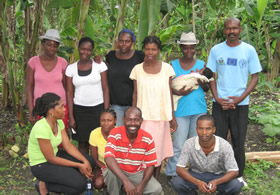
In the municipality of Moron, situated in the isolated Grand'Anse Department of Haiti, a group of women are making their way towards their shared community garden – a space that has been set up with the help of FAO and its partners, including the French NGO Médecins du Monde, the German Red Cross and various local NGOs. The community garden has become a neighborhood hub — buzzing with activity — where the women farm together, but also regularly attend classes, workshops and practical trainings on how to make informed nutritional choices and improve their production of crops and small livestock. They are amiably referred to as "mamans lumiéres" by the project staff, a French term meaning "light mothers", because of their willingness to impart any newly acquired knowledge to other women in their community, thus activating a positive ripple effect that has helped to abate child malnutrition in this remote rural area. Read more »
Weaving a better future in Guatemala
Where: Guatemala
Who: AGEXPORT, Guatemalan Exporters Association, IFAD
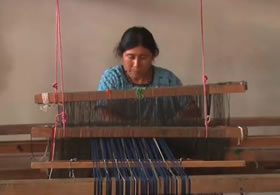
Women and men cannot be economically empowered without access to markets. For poor rural producers in developing countries around the world, distance and disconnection from functioning markets is a huge challenge. Women are often doubly disadvantaged, particularly when they lack literacy and numeracy skills and tradition prevents them from joining producers' groups that give them bargaining power. In Guatemala, indigenous women weavers are now connecting to profitable overseas markets with support from IFAD and practical guidance from AGEXPORT, the Guatemalan Exporters Association. Maria Ana Gonzalez leads a group of 11 weavers who are exporting to the United States under their own label. With advice from Gaby Gomez, an industrial designer working for AGEXPORT, Gonzalez's group has learnt to blend traditional colours and techniques with modern designs. Gonzalez's group has also benefited from IFAD support for business training and access to loans to upgrade their looms. The women and men weavers involved in the new venture are now earning up to 90 per cent more than when they sold their textiles only on local markets. Crucially, Gonzalez has also learnt how to calculate the costs of materials and labour. Before she learnt how to do this, she was often selling at a loss. Holding up a cloth with all the colours of the rainbow, she says modestly, "This is one of our designs. People like it a lot. It sells well here and also abroad." Read more: Fact sheet | Video: Rural Poverty — In Their Own Words, Guatemala
Related Links
For more voices from rural women and related resources, visit the following sections: